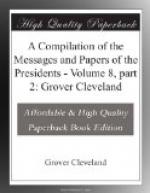Seeing that Mr. Hise had been positively instructed to make no treaty, not even a treaty of commerce, with Nicaragua, Costa Rica, or Honduras, I had no suspicion that he would attempt to act in opposition to his instructions, and in September last I was for the first time informed that he had actually negotiated two treaties with the State of Nicaragua, the one a treaty of commerce, the other a treaty for the construction of the proposed ship canal, which treaties he brought with him on his return home. He also negotiated a treaty of commerce with Honduras; and in each of these treaties it is recited that he had full powers for the purpose. He had no such powers, and the whole proceeding on his part with reference to those States was not only unauthorized by instructions, but in opposition to those he had received from my predecessor and after the date of his letter of recall and the appointment of his successor. But I have no evidence that Mr. Hise, whose letter of recall (a copy of which is herewith submitted) bears date the 2d day of May, 1849, had received that letter on the 21st day of June, when he negotiated the treaty with Nicaragua. The difficulty of communicating with him was so great that I have reason to believe he had not received it. He did not acknowledge it.
The twelfth article of the treaty negotiated by Mr. Hise in effect guarantees the perfect independence of the State of Nicaragua and her sovereignty over her alleged limits from the Caribbean Sea to the Pacific Ocean, pledging the naval and military power of the United States to support it. This treaty authorizes the chartering of a corporation by this Government to cut a canal outside of the limits of the United States, and gives to us the exclusive right to fortify and command it. I have not approved it, nor have I now submitted it for ratification; not merely because of the facts already mentioned, but because on the 31st day of December last Senor Edwardo Carcache, on




